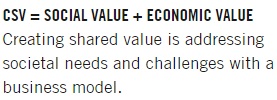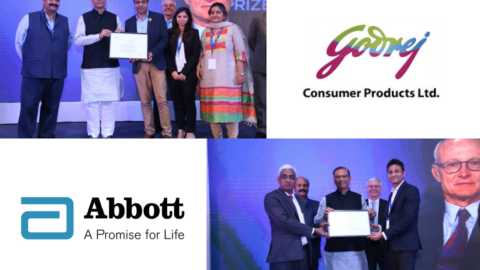
Understanding Shared Value

-
United Nations adopt Sustainable Development Goals
, Blog, 0
The United Nations adopted Sustainable Development Goals (SDGs) on September 25th, 2015 where global leaders including Indian Prime Minister...
-
Two Indian companies recognised in Fortune ‘Change the World’ list
, Blog, 0
Fortune in association with Shared Value Initiative and FSG has recently launched its annual ‘Change the World’ list for...
-
Mahindra Insurance Brokers and Trringo win the Porter Prize 2018 for Creating Shared Value
, Blog, 0
Harvard Business School Professor and leading management thinker, Michael E. Porter addressed a gathering of top industry leaders, thinkers...
-
Godrej Consumer Products Limited and Abbott India win the Porter Prize for Creating Shared Value
, Blog, 0
The Porter Prize 2016 was awarded to ten enterprises in nine different categories in an event organized by...
-
Fortune launches ‘Change the World’ list
, Blog, 0
In a first of its kind, Fortune Magazine recently launched its ‘Change the World’ list. The list names top...
-
Thinking Beyond Bottomlines
, Blog, Opinion, 0
Every now and then, capitalism finds itself at a crossroads. The devastation of two World Wars and the depression...
-
Project Gamchha – Sharing Values Equitably
, Blog, 0
Bhagalpur is one of the oldest cities in Bihar and is home to skilled weavers who produce silk...
Latest Posts
-
 Mahindra Insurance Brokers and Trringo win the Porter Prize 2018 for Creating Shared Value June 1, 2018
Mahindra Insurance Brokers and Trringo win the Porter Prize 2018 for Creating Shared Value June 1, 2018
-
 Thinking Beyond Bottomlines November 17, 2016
Thinking Beyond Bottomlines November 17, 2016
-
 Godrej Consumer Products Limited and Abbott India win the Porter Prize for Creating Shared Value October 21, 2016
Godrej Consumer Products Limited and Abbott India win the Porter Prize for Creating Shared Value October 21, 2016
-
 Two Indian companies recognised in Fortune ‘Change the World’ list October 14, 2016
Two Indian companies recognised in Fortune ‘Change the World’ list October 14, 2016
-
 Project Gamchha – Sharing Values Equitably December 18, 2015
Project Gamchha – Sharing Values Equitably December 18, 2015
-
 Branded media can lose biz with ‘fake news’:Times Network CEO November 30, 2018
Branded media can lose biz with ‘fake news’:Times Network CEO November 30, 2018
-
 Shared Value an important lever in Prime Minister’s Vision of New India 2022 August 15, 2017
Shared Value an important lever in Prime Minister’s Vision of New India 2022 August 15, 2017
-
 Capturing consumer attention in a competitive landscape April 4, 2017
Capturing consumer attention in a competitive landscape April 4, 2017
-
 Why companies need to share to care December 29, 2016
Why companies need to share to care December 29, 2016
-
 Thinking Beyond Bottomlines November 17, 2016
Thinking Beyond Bottomlines November 17, 2016










